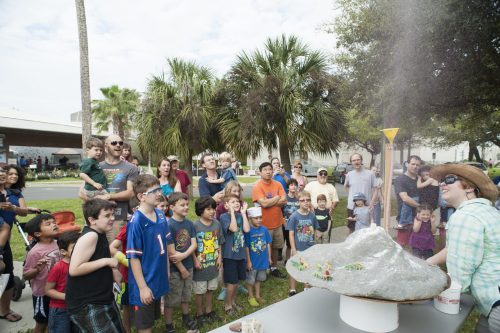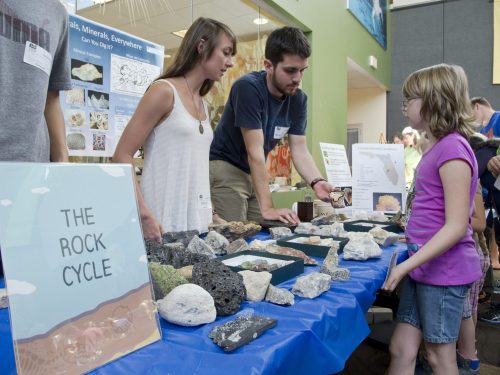GAINESVILLE, Fla. — The Florida Museum of Natural History and University of Florida department of geological sciences are partnering to help visitors dig into geology at the 13th annual ‘Can You Dig It?’ program on March 16 from 10 a.m. to 3 p.m.
This free event was created for people who are curious about the physical world. The interactive activities and demonstrations provide visitors with a new and creative understanding of Earth’s foundations and the role its processes and materials play in their lives.

“Understanding a bit more about how Earth works can add a lot of benefit and extra enjoyment to many of the things we do in life,” said program coordinator Matthew Smith, a senior lecturer and undergraduate adviser in the UF department of geological sciences. “This could be anything from reading about issues to visiting one of Florida’s springs or even taking a trip to the mountains.”
The UF College of Journalism and Communications Media Effects and Technology Lab will participate for the first time at this year’s event, sharing virtual reality experiences that teach about the effects of geological processes.

“It’s important to learn about geology because it is the foundation of the Earth’s environments,” said Florida Museum educator Chelsea Collison. “Geology determines what life can live in certain areas and can influence the climate.”
Some popular returning events include the augmented reality sandbox, a “make your own earthquake” simulator, and an oil spill and cleanup station.
Food from Cilantro Tacos and Philly Five’s Delicious Dogs will be available for purchase during the event.
“Can You Dig It?” is presented by the UF department of geological sciences and the Florida Museum in collaboration with the Gainesville Gem and Mineral Society. Additional support provided by Martin and Cynthia Ivey.
For more information visit www.floridamuseum.ufl.edu/event/can-you-dig-it or call 352-273-2062.
-30-
Writer: Jessica Finkel, 352-273-2032, PRintern@flmnh.ufl.edu
Sources: Chelsea Collison, 352-273-2062, ccollison@flmnh.ufl.edu; Matthew Smith, 352-392-1554, mcsmith@ufl.edu
Media Contact: Paul Ramey, 352-273-2054, pramey@flmnh.ufl.edu
Can You Dig It? Activities List
10 a.m.–3 p.m. March 16, 2019
Florida Museum of Natural History
3215 Hull Road, Powell Hall on the UF campus
Activities occur throughout the day unless noted
Augmented reality sandbox: Understanding topographic maps
This sandbox combines real sand with virtual reality to show how two-dimensional topographic maps show the 3D shape of the land. Make your own surface in the sandbox and watch as the virtual reality projection mirrors your model. Then, make it rain in the sandbox and see how virtual water flows in your model.
Event information station and passport prizes
Grab a passport and collect stamps as you explore, then receive a prize for your completed passport!
Fossil dig
Sift for fossils alongside Florida Museum paleontologists.
Fossil wash and paleobiology
Sift sand for microfossils using screens and water!
Gainesville Gem and Mineral Society: Experience rocks and minerals
Explore rocks and minerals through touch, experiments and games.
Gainesville Gem and Mineral Society: Hobbies that rock
Find out how hobbies such as collecting, rockhounding and lapidary (cutting or polishing gems) can be fun for the whole family.
Groundwater: Florida’s precious natural resource
Investigate how groundwater flows through and shapes the subsurface while discovering Florida’s underground rivers. Explore what you can do to protect our drinking water supply.
Invertebrate paleontology
Come and experience Florida’s many invertebrate fossils, big and small, with specimens and activities from the Florida Museum Invertebrate Paleontology Division.
Investigating ocean acidification
The Earth is a big interconnected system. Discover how increased carbon dioxide in the atmosphere can threaten coral reefs in the ocean!
Make your own earthquake
Learn about how, why and where earthquakes happen, and then make your own earthquake to find out how you measure on the Richter scale.
Oil spill and cleanup
Investigate how chemistry is used to clean up these environmental catastrophes.
Paleomagnetism
Rocks contain their own compasses, and they don’t always point north. See how scientists use Earth’s magnetism to reconstruct how the continents have moved through time.
The power of water: How the land gets its shape
Use wave tanks and other interactive models to explore water’s power in shaping our ever-changing environment.
The rock cycle
Discover how rocks are continuously recycled on Earth into new rocks and learn about the different environments in which they form.
Rock drilling
See how geologists use the drilling process to obtain core samples from hard rock as the first step in determining a past continent’s magnetic direction and location on Earth.
Sea level rise
Florida’s geological history has been defined by changing sea levels. Learn why sea level changes, and how sea level rise is expected to affect the Florida coastline in the future.
Secrets of sand
Take an up-close look under a microscope to see the secrets of sand revealed.
Tools of a geologist
Learn why geologists are the real “Inspector Gadgets” and bring your minerals and rocks to be identified.
Volcanoes (periodic eruptions scheduled on the hour and half-hour starting at 10:30 a.m. until 2:30 p.m.)
Participate in ongoing interactive demonstrations and investigate why some volcanoes erupt explosively while others often do not, but watch out – ours is ready to blow.
Virtual reality environmental expeditions: Underwater and on the ice
Rehabilitate oil slicked penguins, explore coral reefs coping with ocean acidification and join an Antarctic research team studying climate change in three VR simulations hosted by the UF Media Effects & Technology Lab.
WaterVentures bus
Learn about Florida’s diverse watersheds, water conservation and recycling.
###